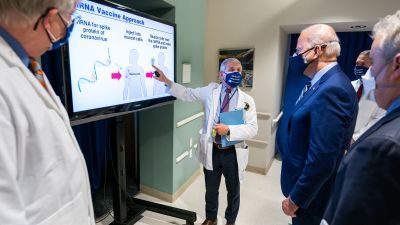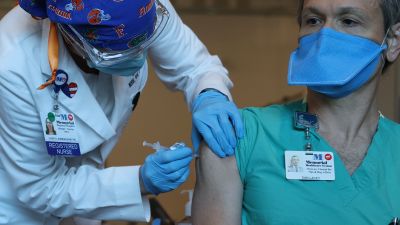
This article is adapted from Unsanitized: The Election Daily Report put out by The American Prospect. You can find the original publication here.
First Response
I’m not one to look to banks for political advice, but one thing they do appear to know about is money. So when JPMorgan Chase analysts predict a double-dip recession I take notice. It will be a strange recession because of its likely time limit. Coronavirus vaccines will be out in the world and just awaiting enough production to get into circulation. But the case surge and associated reduction in demand should tip the economy into contraction.
The bank claims that the first quarter of 2021 will be recessionary, but it seems to me that could happen in this quarter. Los Angeles County just suspended outdoor dining, which will destroy its restaurant industry. But the bigger threat is the personal lockdown, not anything government will impose. Regardless of whether more restrictions get rolled out, a majority of people will huddle in their homes until the case surge blows over.
The economy is getting a burst with Thanksgiving travel above the low level of the pandemic, and will get more with holiday shopping. But that travel could also cause an equal and opposite reaction of more infections. December could look like March and April, even as the vaccine starts getting into the arms of frontline workers. Just two weeks of shutdown in March was enough to push the numbers negative for the quarter.
Of course, whether GDP is above or below water is kind of an irrelevant sideshow in the midst of an economic picture that resists easy characterizations. Inequality has made aggregate economic indicators a poor way to assess the level of financial stress, and the pandemic has supercharged inequality. It’s also created mercurial differences between random professions based on whether they rely on congregations of people indoors: so landscaping goes up, for example, but gym memberships go down.
Stories about the U.S. consumer “holding up,” aside from being based on outdated economic data (I haven’t seen much beyond September, leaving out a couple months with little or no CARES Act spending going out), just agglomerate together rich and poor populations living in different Americas. An incredible 20 percent of downtown businesses in Madison, Wisconsin have closed for good. Guitar Center is the latest retail outlet to hit bankruptcy. One in four people in Rhode Island cannot meet their basic food needs. And even in the aggregates, monthly job openings are falling, the poverty rate is rising.
Those millions of people suffering aren’t just getting the cold shoulder from Congress; they’re about to get dumped on the street with nothing. We’re now starting to see the term “COVID cliff” to represent the number of relief policies that expire at the end of December. This includes two key unemployment programs giving benefits to 12 million people; the freeze on student loan payments; the makeshift (and relatively ineffective) moratorium on evictions, which if it expires could unleash a flood of 6 million disposessions; and boosts to the Earned Income Tax Credit and the Child Tax Credit, which have quietly increased paychecks for the working poor.
This is on top of the enhanced unemployment benefits that expired months ago, and “hazard pay” increases long pulled back by private businesses. There’s no current program of small business relief, and there’s no current fund for state and local governments to cove revenue shortfalls. People unaffected by the crisis have been saving because there’s nothing to do, but that other America has been in recession or worse for several months; there’s no double dip here, just one long season of misery.
On top of that, on December 11 the government runs out of spending authority, and we could legitimately see another shutdown, even though both sides claim to not want one.
Our terrible welfare systems are to blame here, forcing patch-up solutions that ran out long before the need did. Now Democratic leaders, including the president-elect, are pushing for a quick stimulus package to avert the double dip recession, though it’s unclear whether they have a negotiating partner in the Senate.
Again, what we need is a bridge, as vaccine distribution will bring back a host of businesses that cannot otherwise function. We can see the end in sight and just have to prevent destruction and scarring for millions for a short while. You need a very large amount of spending to provide support but you don’t need it for an extended period the way you did in March. The failure of the CARES Act to extend to full level of need is not as much of a pitfall now.
But doing nothing would be an absolute and monumental disaster for millions of neglected and invisible Americans. They’re the hardest groups to get in the front of mind of policymakers, and they risk being left behind, again.
Days Without a Bailout Oversight Chair
242.
Today I Learned
- “The value of the ability to end a pandemic is worth 5-15 percent of total wealth.” (NBER)
- Every couple weeks you see a story about how the pandemic has created “opportunity” for mergers and acquisitions. Why is that desirable? (Axios)
- The analyst shorting the housing market because of pandemic risks, as well as climate change. (CNBC)
- Incredibly people are shopping at indoor malls in the midst of this latest surge. (Wall Street Journal)
- What exactly do we know about the agreements government has made with vaccine makers? (Financial Times)
- Italy either nonchalant or just deadened by the continued loss of life in the pandemic. (Washington Post)
- Democrats just can’t stay out of their own way with the “gatherings for me but not for thee” stuff. This time, Andrew Cuomo. (New York Times)



